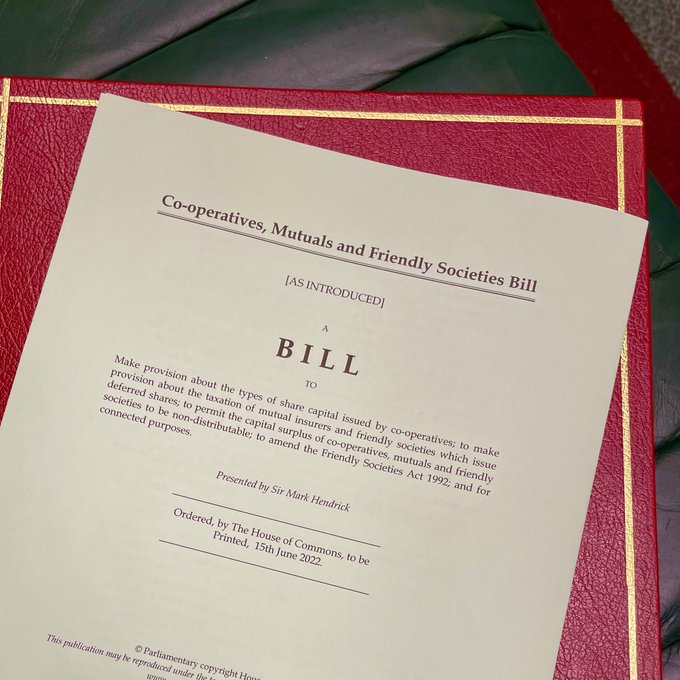Westminster, (Parliament Politics Magazine) – One of the reasons I became involved in politics is because I was interested in how we might spread prosperity and wealth more fairly in our society. As the Labour and Co-operative MP for Preston since 2000, I’ve seen in my own city how inequality is a blight on people’s lives and how business – when done fairly – can be part of the solution to the challenges we face.
Whether it is through providing quality work, strengthening community enterprise, or supplying affordable services to consumers, a strong network of co-operative and mutual businesses can play an important role in a diverse and modern economy. Co-operatives and mutuals represent a serious contribution to the UK economy, accounting for over £133.5 bn of income annually.
Yet, despite the success and resiliency of cooperatives and mutuals, today’s outdated laws do not fully supportthis vital sector and its contributions to the biodiversity of our economy.
This is why I have introduced a Bill that will bringforward long overdue changes to the legislation that governs cooperatives and mutuals, creating a more modern and supportive business environment for them to operate.
The Cooperatives, Mutuals and Friendly Societies Bill(CMFS Bill), which had its second reading in the House of Commons on Friday 28th October, will ensuregovernment policy that understands and supports the mutual business difference. It will also create legislation that permits co-operatives, mutuals and friendly societies to undertake their business purpose of serving their members’ needs in the best way possible.
Crucially, it will give co-operatives and mutuals the opportunity to opt-in to a framework of greater safeguards for their assets and more protection against demutualisation.
My Bill does this by proposing simple voluntary legislation that would give every mutual the right to choose a constitution – either at the point of establishment, or thereafter, with an appropriate level of member approval – that preserves legacy assets for the purpose they were intended.
At the moment, legislation governing mutuals can incentivise demutualisation by permitting legacy assets to be distributed. Legacy assets may have been built up over generations of membership and often constitute a significant part of the working capital of a business. Current members typically have not contributed to this capital base but have enjoyed the benefits of previous years of successful trading.
Mutuals, therefore, remain a target for asset stripping demutualisers, attracted by the prospect of acquiring significant legacy assets built up over generations of members.
Many will recall the proposed, but ultimately unsuccessful, sale and demutualisation of the insurer, Liverpool Victoria (LV=) in 2021. LV=’s leadership argued that the sale to Bain capital, a private equity firm,was needed to help the business grow but, in the end,its members voted to block the takeover.
While most demutualisation attempts succeed, assisted by a significant power imbalance between boards of mutuals and members, the lived experience of nearly all these demutualisations is that the converted firm rarely remains independent for long. Very few businesses that are demutualised remain independent because they themselves are traded and rapidly merged into other businesses.
The episode with LV= raised considerable concern around the protection of mutual assets and the long-term preservation of the mutual model. The CMFS Billwill bring forward legislation that will disincentivise the raiding of legacy assets, ensuring that they are preserved for the purpose they were intended. It would match the best legislation that already exists in many countries.
Although the bill does not cover the whole scope of what I wanted it to achieve, I am pleased that the government is backing a key section of my proposals concerning mutual assets.
The government has also given assurances that it plans to conduct a wider review of key legislation underpinning the co-operative, mutuals and friendly societies sector, which is in my view major progress. I hope to see those assurances and the scope of the review outlined in the Committee stage of the Bill, to ensure that our aims and interests for the sector are indeed shared.
Only by working in a modern and supportive business environment, will co-operatives, mutuals and friendly societies be able to make a full contribution to the prosperity of our country by serving the interests of members, customers and citizens. The Co-operatives, Mutuals and Friendly Societies Bill will help achieve this.
Sir Mark Hendrick is a former electronics engineer and college lecturer, Sir Mark began his political career as a Salford City Councillor in 1987 before being elected as a Member of the European Parliament for Central Lancashire in 1994.
Sir Mark became MP for Preston at the November 2001 by-election and has been re-elected at every General Election since. He chairs the APPG for Norway and has been on several influential parliamentary committees including the Foreign Affairs Select Committee, International Development Committee and the European Scrutiny Committee. He currently serves on the International Trade Committee and the Panel of Chairs and is Deputy-Chair of the APPG China Group.
Sir Mark was awarded a knighthood for services to Politics in the Queen’s New Year’s Honours List 2018.

